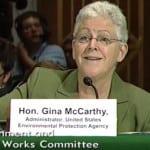The Environmental Protection Agency (EPA) released its “Clean Power Plan” proposal today, which spurred a wide range of responses. Environmental groups applauded the guidelines while fossil fuel proponents decried the end of affordable energy.
Power plants are the largest source of carbon pollution in the U.S., accounting for roughly one-third of all domestic greenhouse gas (GHG) emissions. The proposed guidelines seek to cut these emissions by 30% from 2005 levels by 2030.
Conservative political advocacy groups, such as the American Coalition for Clean Coal Electricity (ACCCE) and Americans for Prosperity (AFP), issued statements predicting much higher electricity costs, significant job losses, and weakened economic growth if the rules are enacted as proposed.
“Even the administration admits they are ‘unlikely’ to have any meaningful impact on the environment,” AFP President Tim Phillips said. “The new EPA regulations are a lose-lose.”
“If these rules are allowed to go into effect, the administration for all intents and purposes is creating America’s next energy crisis,” said Mike Duncan, president and CEO of ACCCE.
However, some organizations believe the rules will encourage economic growth. Environmental Entrepreneurs (E2)—an affiliate of the Natural Resources Defense Council (an environmental action organization)—believes the standards will provide the catalyst to drive innovation and investments in renewable energy and energy efficiency, thus triggering economic growth throughout the U.S.
“Here’s what these standards mean for America: More jobs, less carbon pollution,” said Bob Keefe, executive director of E2. “Anyone who suggests otherwise apparently doesn’t believe in American businesses’ ability to innovate and lead.”
Even groups outside of the U.S. were weighing in on the announcement. Scottish Carbon Capture & Storage (SCCS)—an independent research partnership of British Geological Survey, Heriot-Watt University, University of Aberdeen, and the University of Edinburgh—issued the following statement in a press release: “Contrary to arguments raised by critics that the new U.S. rules will cause power plants to close and electricity prices to rise, the UK government’s Select Committee on CCS, in a report published last month, said that developing CCS technology would reduce wholesale electricity costs in 2030 by 20%—and the Energy Technologies Institute has said CCS will halve the economy-wide cost of delivering low-carbon power by 2050.”
Many people in the U.S., however, don’t even feel the EPA should have the authority to regulate CO2 emissions. “It is our position that climate change policy should be directed by Congress. The decision by EPA to move forward with rulemaking to regulate CO2 emissions from existing [Electric Generating Units] raises serious legal and implementation questions,” 29 members of the Texas congressional delegation wrote in a May 22, 2014, letter to EPA Administrator Gina McCarthy.
While Texas leaders oppose the rules, nine other states—Connecticut, Delaware, Maine, Maryland, Massachusetts, New Hampshire, New York, Rhode Island, and Vermont—participants in the Regional Greenhouse Gas Initiative (RGGI), the nation’s first market-based regulatory program to reduce GHG pollution, welcomed the proposed guidelines.
“The RGGI states’ experience demonstrates that market-based carbon reduction programs achieve the most cost-effective emission reductions, enable a transition to a low-emitting, reliable, and efficient power sector, and build state economies while growing jobs,” the group said in a press release.
“Although the administration’s carbon regulations may take center stage today, there’s no assurance that the president’s plans will have an extended run—or for that matter, any effective run at all. Litigation against the EPA’s continued efforts is inevitable—and the only safe bet is an extended struggle on many fronts all the way to the Supreme Court,” said Richard O. Faulk, senior director of energy and environment initiatives at George Mason University School of Law and partner at Hollingsworth LP in Washington, D.C.
—Aaron Larson, associate editor (@AaronL_Power, @POWERmagazine)










